This House believes Arabs, not NATO, should be dealing with Libya
Monday April 18 2011
MOTION REJECTED
by 45% to 55%
Transcript
Order of speeches
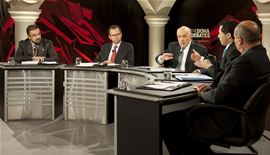
- Introduction
- Mohammed Ali Abdallah
- Fadel Lamen
- Paul Salem
- Omar Ashour
- Audience questions
- Vote result
Introduction
 TIM SEBASTIAN
TIM SEBASTIAN
Ladies and gentlemen, a very good evening to you, and welcome to the latest in our series of Doha Debates, coming to you from the Gulf state of Qatar and sponsored by the Qatar Foundation. One of the main reasons given by NATO leaders for intervening in the Libyan conflict was that the Arab states asked them to. But what business has the West got intervening once again in a conflict in an Arab Muslim state? At a time when Arabs themselves are rising up against their leaders, shouldn't they take sole responsibility for the outcome of their actions? And isn't it more important than ever that the West stays out of whatever new Arab world emerges from all the turmoil and violence? Those questions underlie our motion tonight: ‘This House believes that Arabs, not NATO, should be dealing with Libya' - and as you'd expect, our panellists tonight disagree fundamentally on the issue. Speaking for the motion, Mohammed Ali Abdallah, Deputy Secretary General of the National Front for the Salvation of Libya, one of the country's most prominent opposition groups in exile. And with him, Paul Salem, founder of the Lebanese Center for Policy Studies and now Director of the Carnegie Middle East Center in Beirut. Against the motion, Fadel Lamen, President of the American Libyan Council based in Washington DC. He's a writer, journalist and adviser on the Middle East and North Africa. Also opposing the motion, Dr Omar Ashour, who lectures in the Politics of the Modern Arab World - plenty to keep him busy there - at the University of Exeter in the United Kingdom. Ladies and gentlemen, our panel. [Applause] So now let me first ask Mohammed Ali Abdallah to speak for the motion.
Mohammed Ali Abdallah
Speaking for the motion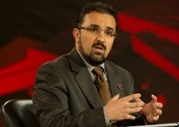
MOHAMMED ALI ABDALLAH
Thank you. It's a pleasure to be here. First of all, we can all agree, I think, that there are no ideal scenarios and there are no euphoric outcomes in this situation in Libya. Everyone agrees that this is a catastrophe that the Libyan people are facing due to Gaddafi's behaviour. So therefore an optimal scenario is what we're looking for, with the least sacrifices and least prices in lives, innocent lives, paid. The objective of any intervention, whether it's from the Arab world or any other party, first of all is to save lives and to protect civilians. And this is what the Libyan people called upon, and this is why the Libyans themselves asked for an intervention into protecting civilians in Libya. The second objective is to enable the Libyans to actually be able to voice themselves in a peaceful manner, to demand their rights - their rights that have been taken from them for 42 years under the dictatorship of Gaddafi. And this is something that at an international level is recognised as a right for these people. Now, why the Arabs should be the ones intervening and not NATO: I think the close proximity of the Arab countries, first of all, is a practical reason. And more importantly, the cultural similarities and understanding - whether it's the language, religion, and beyond that into the social makeup of the region - I think this gives the Arab countries an advantage in being able to intervene. However, the most fundamental reason, in my opinion, is that this was an opportunity for the entire region, the entire Middle East region, to shift a very important paradigm: and that paradigm is that the Middle East is a hotbed for problems, and the Middle East is typically a place where we get oil from for the rest of the world, but also there's a lot of conflict and wars. Having spent more than 25 years in the West, this is the immediate perception any time you mention the Middle East. This was an opportunity to shift that paradigm, having Arab leaders step in and Arab people driving these leaders to step in and fix our own problems here in this region, I think this would have been a regional revolution in addition to the local revolutions that we've seen for the past few months, which is starting to shift the paradigm locally. This was an opportunity to shift the paradigm at a regional level, and I think the boat was missed.
TIM SEBASTIAN
Okay, Mohammed Ali Abdallah, thank you very much indeed. I'm slightly curious as to how you think a group of countries as divided and warring amongst each other as the Arab states could actually organise an intervention, a coherent intervention in Libya: how do you think they might manage that?
MOHAMMED ALI ABDALLAH
I think the same way...
TIM SEBASTIAN
They've never shown the slightest inclination to do it in the past, have they?
MOHAMMED ALI ABDALLAH
Yeah, and this is exactly the point, Tim, is that we are in a new era. We are in the era of where the people are driving the decisions, and not the regimes. And this is what Bouazizi will be always remembered in history for breaking that wall.
TIM SEBASTIAN
Yes, but you're saying you want Arab regimes to intervene in Libya?
MOHAMMED ALI ABDALLAH
Yes, but you want Arab regimes driven by their people, and not the Arab regimes who are driving for their own interests to keep their seats.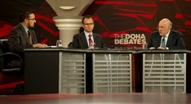 TIM SEBASTIAN
TIM SEBASTIAN
Well, they'll still be the same regimes that sat down with Colonel Gaddafi at a time when he was being accused of torturing and mistreating his own people. You think the Libyans would like that now?
MOHAMMED ALI ABDALLAH
I think we are lucky in Libya to have to our East and to our West new regimes that are not people who have committed crimes, and that are not people who have driven the support for Gaddafi. And these regimes were brought to power by their own people, and I think this was a precedent that was put in place. And unfortunately Libya was not able to benefit from that in a practical sense up until now, but I think the opportunity for that is still there.
TIM SEBASTIAN
You've seen the signs from Arabs and Libyans on the streets there. They're not in Arabic; they're in English, aren't they?
MOHAMMED ALI ABDALLAH
They are in English, but this is the new world!
TIM SEBASTIAN
They want help from the West. And asking.
MOHAMMED ALI ABDALLAH
I don't think holding signs in English necessarily means that you want help from the West. I think..
TIM SEBASTIAN
Well, it's not asking for help from here, is it?
MOHAMMED ALI ABDALLAH
I think that the people were driven to that. That was not an optimal conclusion. I think people were forced to do that. I think Libyans, we welcomed the UN intervention and the NATO intervention eventually, but this debate and this discussion was: should have the Arabs been the ones to intervene as a position from a practical standpoint?
TIM SEBASTIAN
So the Arabs, who are more used to fighting against each other than with each other, are suddenly going to bury their differences and turn up offering aid, assistance, help with democracy - all kinds of things that they haven't even got in their own countries, they're going to offer them to Libya now, are they?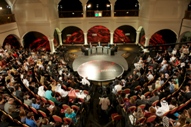 MOHAMMED ALI ABDALLAH
MOHAMMED ALI ABDALLAH
I think there are some countries who are ready to do that, and this is the paradigm shift.
TIM SEBASTIAN
Which ones? Which ones - who's ready?
MOHAMMED ALI ABDALLAH
I think Egypt. I think we are sitting in a country -
TIM SEBASTIAN
It's ready? It's still under emergency rule! How can it be ready?
MOHAMMED ALI ABDALLAH
[laughs] I think the country we're sitting in, Tim, the country we're sitting in has set that example, and we salute Qatar for taking the leadership role as an Arab country. Okay.
TIM SEBASTIAN
Send a handful of planes - that's it, that's an intervention, is it?
MOHAMMED ALI ABDALLAH
I'm sorry?
TIM SEBASTIAN
Send a handful of planes. That's an intervention?
MOHAMMED ALI ABDALLAH
I think there's a lot more being done than a handful of planes!
TIM SEBASTIAN
Okay, all right, Mohammed Ali Abdallah, thank you very much indeed.
MOHAMMED ALI ABDALLAH
Thank you.
TIM SEBASTIAN
And now, please, Fadel Lamen, would you speak against the motion.
Fadel Lamen
Speaking against the motion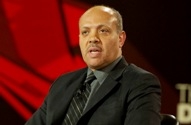
FADEL LAMEN
Thank you very much. I would like to say that there is the issue of should somebody deal with something and an issue of can somebody deal with something there. I think hypotheticals are very easy to discuss, but the reality is when we have to deal with a decision and the ability to do something, I think we have to question the possibility of the ability of the Arab countries to be able to deliver. And I think when I look at the intervention here, I look at it, it's beyond an Arab world. It's the issue of, it comes from the United Nations: it's the concept of humanitarian intervention that was adopted by the United Nations after miserable and disastrous experiences for a number of years from Cambodia in Asia, to Kosovo and Bosnia in Europe to Rwanda and other countries in Africa. I think the world have said enough is enough. Dictators cannot rely on what used to be called as sovereignty so they can do whatever they want within their country with their own people. And I think that concept is called the responsibility to protect. It's not a responsibility only of the Arab world; it's a responsibility of all the world to protect each other as humans. And I think finally the United Nations came to realise that there is a responsibility by themselves to do that.. And I think the question was, who can do it? Who can intervene, who can protect the civilians? The United Nations cannot do it itself. The Arab League? Well, if we look at the Arab world and the Arabs can do it, then let's talk about the Arab League: who's going to do it? The Arab League is a group of countries that the organisation's designed to protect the regimes, to help cooperate and coordinate within the regimes, mostly in foreign policy. It has no mandate to interfere within their own countries, within the interior issues of these countries. And even if it can, it has no capabilities. It cannot. It has no teeth, so it cannot get to the point that it will enforce any intervention whatsoever against its own members. So they don't want it to be involved. And even...
TIM SEBASTIAN
Could you wrap up, please?
FADEL LAMEN
And even if it can. So the United Nations cannot by itself. The United Nations would rely on member states. And a big chunk of the member states, especially countries that are concerned about democracy and human rights, are within NATO. And that's why NATO got involved, and rightfully so.
TIM SEBASTIAN
Okay. Fadel Lamen, thank you very much indeed. Half the time the Arab world is complaining that the West is acting like the policeman of the world, and now you're saying "Go do it again. Pick up the pieces. Do the dirty work. Things have gone wrong. The Libyan revolution didn't go as expected, so the West should jump in." You can't have it both ways. One moment you're complaining they're policemen, and the next moment you want them to come in.
FADEL LAMEN
I think most of the people, there is a perception about involvement: the involvement in a situation in a country like Iraq which its people have issues with, only involved for the right reason. I think the West had the opportunity and they were involved in...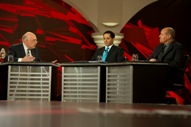 TIM SEBASTIAN
TIM SEBASTIAN
Well, either you want a new Arab world or you don't - new relationships with the Western world or you don't.
FADEL LAMEN
Of course.
TIM SEBASTIAN
If you bring in NATO, it's going to perpetuate the old relationships, isn't it?
FADEL LAMEN
No, it doesn't. It doesn't. It doesn't. It doesn't. It doesn't.
TIM SEBASTIAN
Bringing in the global policeman again. This is exactly what Arabs are saying all around the region they don't want.
FADEL LAMEN
They are not saying that right now.
TIM SEBASTIAN
Not Libya?
FADEL LAMEN
They said it when there was an intervention. No, they are not. I think the majority of the Arab world is with the intervention; as the majority of the Arab world is Muslim, they were for the intervention of NATO and the Western countries in Kosovo and Bosnia. The problem with the Western countries is they were not able to market their successes and their good interventions to the Muslim and the Arab world. And they failed.
TIM SEBASTIAN
And when all the civilian casualties mount up as they are, and the hatred then is directed again against the West, what's in it for the West to do this?
FADEL LAMEN
I think NATO and the Western countries are very smart right now to try to avoid all civilian casualty, and they know...
TIM SEBASTIAN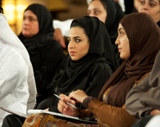 But the civilian casualties are there.
But the civilian casualties are there.
FADEL LAMEN
There are possibly. I think...
TIM SEBASTIAN
There've been dozens of them. And the intervention is not pleasing anything.
FADEL LAMEN
I know! And that's what the Libyan regime said - there are civilian casualties. I have not seen the official report.
TIM SEBASTIAN
But the intervention is not pleasing the rebels either. They're saying NATO isn't doing enough.
FADEL LAMEN
Not enough. They want more.
TIM SEBASTIAN
They want more?
FADEL LAMEN
Oh, yeah. But they have to understand that there are limitations.
TIM SEBASTIAN
So NATO should jump just because some group says "We need you"?
FADEL LAMEN
No. I think the rebels have to understand that there is a limitation for Western intervention too.
TIM SEBASTIAN
All right, Fadel Lamen, thank you very much indeed.
FADEL LAMEN
Thank you.
TIM SEBASTIAN
Paul Salem, could I ask you please to speak for the motion.
Paul Salem
Speaking for the motion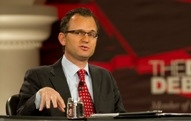
PAUL SALEM
Yes, I definitely think that the Arab countries and the countries of the region should be taking the lead in this initiative. They did take the lead in calling for the initiative: it was the Arab League, the GCC and Organisation of Islamic Conference after the Libyan rebels asked for a no-fly zone that the Arab League and these regional leaders made the public statements that then were taken to the Security Council. I think the Arab countries, and possibly Turkey as well, should have taken a leading role with the international community. At the end, it is a Security Council resolution, as it should be, and so it should have had significant Arab participation, probably also Turkish participation, as well as international participation, whether it's NATO or other countries. It need not have been an either/or thing. This has been done before - it was done in the liberation of Kuwait. It was successful. The Arab countries sent troops. There was coordination and it was successful. It is our responsibility in the region, it's our responsibility first to react to atrocities and things that happen in the region, not just to call for others to come and help us out with our problems. In addition, there's been billions and billions of dollars spent on military hardware in the region. What better cause to put it to use than to defend innocent civilians against an atrocity that the Arab League and the states themselves have said it is an atrocity? Particularly at this moment, when the Arab peoples have stood up for human rights, for freedom, for freedom from repression, for democracy; particularly in Egypt and Tunisia, the two countries bordering Libya, and the Libyan people responded or reacted. And to not have even the states bordering Libya really put their money where their mouth is, as it were, I think is a great moral failing. We want to be taken seriously as a region. We want to be taken seriously when we complain about Israel doing this or that or the other thing, and yet we do not react as a group of nations, either when Saddam did what he did in Iraq or what happened in Darfur or what's happening now in Libya. I think there is still time for Arab countries to participate more fully. Qatar did send something, more than others did. Much more can be done, and there's still unfortunately a long road in Libya to follow up with.
TIM SEBASTIAN
Okay, Paul Salem, thank you very much indeed. Chaos, flux, political turmoil, violence that characterises the Arab world at the moment. Haven't they got their mind on other things? How do you think they're going to arrange greater assistance to Libya under those conditions?
PAUL SALEM
Well, there certainly is a challenge. And we know that the..
TIM SEBASTIAN
It's more than a challenge - it's an impossibility, isn't it, the state that they're in? PAUL SALEM
PAUL SALEM
It is not an impossibility. No, and I..
TIM SEBASTIAN
They're either clinging to power or there's revolution on the streets, isn't there?
PAUL SALEM
If you take, for example, the Egyptian case, there's no doubt that the military, the armed forces of Egypt have a lot on their hands, but they could have offered at least..
TIM SEBASTIAN
They've still got a state of emergency, haven't they?
PAUL SALEM
They could have offered at least symbolic participation. It wasn't required to offer much more than that. To give much more than this...
TIM SEBASTIAN
That's not much use, is it, symbolic participation. We've got symbolic participation.
PAUL SALEM
It is significant. You had symbolic participation in Kuwait. And, you know, some symbolic, some significant - it makes a difference. But for the Arab states..
TIM SEBASTIAN
But you're talking about a real contribution. You want the Arab states to deal with Libya, not provide a symbolic contribution.
PAUL SALEM
What I'm saying is the following: that the Arab countries are part of the world. The Arab people have declared: "We are not exceptional. We're not different than anybody else. We want dignity, we want democracy, we want pluralism, we want human rights." So when the Arab states, or Turkey or other states from the region, participate in protecting a people in the region, they should do so along with the international community.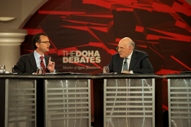 TIM SEBASTIAN
TIM SEBASTIAN
And you say NATO should get out and leave them to it?
PAUL SALEM
No! I think...
TIM SEBASTIAN
Leave them to squabble and argue about what they're going to do, while Gaddafi's men go from house to house in Benghazi putting bullets in the back of people's heads?
PAUL SALEM
No, no, no. Zenga Zeng happened. But yeah, I'm saying we should do it together. But for the Arab countries...
TIM SEBASTIAN
And so you really want it both ways? You want it both ways?
PAUL SALEM
No, I want it as a participatory thing.
TIM SEBASTIAN
You want NATO and the Arabs?
PAUL SALEM
Yes, I do want NATO and the Arabs. Because we're all responsible for protecting civilians. Libyans are human beings of the world, and they have rights.
TIM SEBASTIAN
You're on the side that just wants Arabs to do it, by the way! That's the side you're on in the debate.
PAUL SALEM
Yeah, I want them to take the lead. And they did not take the lead.
TIM SEBASTIAN
And you think they're capable of doing that?
PAUL SALEM
Well, they could take much more of a lead than they did. They have certainly failed on this occasion, and Turkey failed as well.
TIM SEBASTIAN
All right. Paul Salem, thank you very much indeed. Now, could I ask Omar Ashour to speak against the motion, please.
Omar Ashour
Speaking against the motion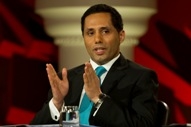
OMAR ASHOUR
Thank you. I think that when it comes to Arab dealing with the crisis in Libya, there is no political will, there is no capacity, and certainly there are no credentials in that sense. Political will: is there a will among the regimes that control the Arab world and not necessarily represent their people? Is there that will to intervene heavily in Libya? The simple answer is no. If we take Egypt as an example: geography, history, identity; 1.2 million Egyptians work in Libya, and at the same time there is no will whatsoever among the military council to heavily engage in Libya at the NATO level. We also, if we come to the question of capacity, Qatar is an exception, obviously. It has a notable and honourable stance when it comes to Libya. Does it have the same military hardware as NATO's? Also the answer is no. We have another problem. We still have a crisis of democracy and human rights in the Arab world, despite the revolutions. The revolutionaries are not in power in Egypt. There is a military council that is in power that came as a result of the revolution. Similar situation in Tunisia. So we're still getting there, but not fully democratic in Egypt and in Tunisia. In the others, or most of the other countries, we have mostly governments that don't represent their people, intransparent in their decision-making, inglorious human rights records and, when it comes to the record of humanitarian intervention, quite problematic. We had Hama before in 1982 in Syria: not much - apathy among the Arab regimes. We had a Darfurian crisis, currently ongoing - apathy as well. We had an Algerian crisis, where more than 150,000 people were killed - also apathy. We also got others: Iraq is a situation, Gaza as well.
TIM SEBASTIAN
Could you come to a close, please?
OMAR ASHOUR
So let's focus on the objective. If the ultimate objective is to build a stable, democratic Libya, I think right now the Arab regimes don't have the credentials. If you deny your people democracy and human rights, you cannot teach it or grant it to others. Thank you.
TIM SEBASTIAN
Omar Ashour, thank you very much indeed. It's not working, is it - NATO intervention is not working? It's not bringing results. It's bringing stalemate and it's prolonging a war. Is that really what you want - prolonging casualties day after day?
OMAR ASHOUR
The intervention started 19th March. Today is 18th April.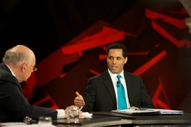 TIM SEBASTIAN
TIM SEBASTIAN
Do you know how many hundreds of sorties, NATO planes, have flown?
OMAR ASHOUR
If the alternative... yes, I know: 5,200 so far.
TIM SEBASTIAN
At least, yeah, yeah.
OMAR ASHOUR
But if the alternative is..
TIM SEBASTIAN
Not much to show for it, is there?
OMAR ASHOUR
If the alternative is Arab airforces, you will definitely see a higher number of casualties and the very wrong end result.
TIM SEBASTIAN
Wrong end result? I mean, look at previous interventions. Look at Afghanistan, look at Iraq. Is that what you want for your country, Libya?
OMAR ASHOUR
You have the - okay, democracies...
TIM SEBASTIAN
Because it never goes right, does it. This is why you don't intervene.
OMAR ASHOUR
Okay. No, no, it does! It does!
TIM SEBASTIAN
Where - where's it gone right?
OMAR ASHOUR
Let me give you a comparison. Democracies have a mixed record when it comes to interventions. They have Iraq and Afghanistan, they have Kosovo, Bosnia, and they have others. They have Germany, Japan. Authoritarian regimes when they intervene, the record is an absolute disgrace.
TIM SEBASTIAN
And none of them brought ideal results, did they? None of them.
OMAR ASHOUR
Soviet regimes when they interfered in Eastern Europe, what was the result? Corruption, repression and others. So authoritarian regimes have an absolutely disgraceful record when it comes to interventions. And that's the real problem. We're talking about the Arab people are very much willing to help the Libyans. Do the governments represent their will?
TIM SEBASTIAN
So let them do it! They voted for this. Why not? Let them do it!
OMAR ASHOUR
Who voted for this?
TIM SEBASTIAN
Arabs. They wanted it! They wanted the intervention.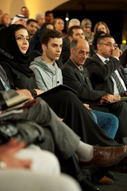 OMAR ASHOUR
OMAR ASHOUR
This came under pressure. I don't think there was a willingness to remove the status quo in Libya, especially among the neighbouring countries like Algeria or Egypt!
TIM SEBASTIAN
The question is whether there should have been. The question is whether Arabs should be dealing with Libya.
OMAR ASHOUR
I don't think this can even happen, in terms of capacity and in terms of will.
TIM SEBASTIAN
There's no `should', there's no question in your mind that it's not time for Arabs to assume responsibility for their own revolutions?
OMAR ASHOUR
Oh, I would hope so! Egypt, I think, is missing a Suez-like moment right now. The leadership of the anti-colonial struggle was led by Nasser. Now it's the leadership of the democratic promotion.. I don't think Egypt is taking that role. Qatar is kind of heading that way, but I don't think Egypt is. And it's unfortunate. It's really unfortunate, yeah.
TIM SEBASTIAN
Long way to go. Long way to go. Omar Ashour, thank you very much indeed.
OMAR ASHOUR
Thank you.
TIM SEBASTIAN
All right, we'll now take your questions on the motion, ‘This House believes Arabs, not NATO, should be dealing with Libya'. The gentleman in the blue shirt, you have a question. We'll get a microphone to you. If you just say where you're from, please.
Audience questions
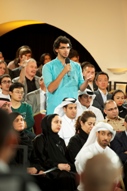 AUDIENCE (M)
AUDIENCE (M)
I'm from Egypt. I have a question for the opposition side, specific to Mr. Ashour but in general to the opposition side. Wouldn't you think it's naïve to assume that the Western nations and members of NATO have the purest of intentions of freedom of expression and democracy to spread in the Middle East when they were the very nations supporting and empowering the regimes such as in Egypt and Tunisia? Everybody knows that Hosni Mubarak was on the CIA payroll, so they just had a change of heart all of a sudden and now they want to spread revolutions and democracy? That's Number 1.
TIM SEBASTIAN
Okay. Look, let's just stay with one question, because there are a lot of people. And I don't know that everybody knows that he was on the CIA payroll, but there you are! [Laughter] Okay. Now, Omar Ashour, do you want to answer that?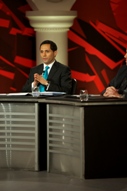 OMAR ASHOUR
OMAR ASHOUR
Sure, absolutely! States in general are not charity foundations; they have their own interests. There is more and more realisation among successive administrations since 9/11 that in the long term and the mid term it is in their strategic interests to build democracies in the Middle East for longer stable relationships. And what's happening in Libya, nobody wants to be dragged again into a civil war because of a repressive, authoritarian regime - in Libya or elsewhere.
TIM SEBASTIAN
The question was about Western intentions.
OMAR ASHOUR
This is the intentions. The intentions ultimately... We have a mixed record of Western interventions.
AUDIENCE (M)
You said the intention was to spread democracy and that was growing since 9/11. How is that so if they were in fact hanging these leaders such as Hosni Mubarak and his likes to stay in power and to control the people? Wouldn't that seem contradictory to you?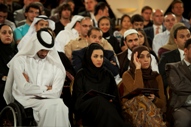 OMAR ASHOUR
OMAR ASHOUR
The interests with Mubarak was to keep him there. The interests right now in Libya is to remove al-Gaddafi. We have people dying in Misrata, and...
AUDIENCE (M)
So it's just a matter of interests of the Western nations? It's not about democracy.
OMAR ASHOUR
Sorry?
AUDIENCE (M)
So it's just a matter of interests of the Western nations; it's not about democracy?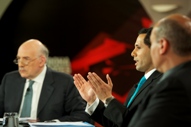 OMAR ASHOUR
OMAR ASHOUR
No, no, it's mostly interests. You can name them and shame them and you can use democracy as a pressure tool, but it is mainly about interests. I'm saying that. I'm not saying it's a moralistic stance..
AUDIENCE (M)
Thank you very much. You just admitted that it's...
OMAR ASHOUR
Right now the interest in Libya is to have a democratic Libya after a while. And I think trying to save the people of Misrata and Tripoli and Benghazi is a humanitarian mission. And after that mission there will be a process of democratic building, similar to what happened in Kosovo. At least, this is what we'll be pushing for and what we should all be pushing for.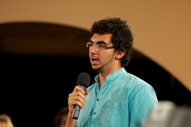 AUDIENCE (M)
AUDIENCE (M)
You just described it as a pressure tool.
OMAR ASHOUR
Sorry?
AUDIENCE (M)
You just described it as a pressure tool. How could it also be a humanitarian mission all at the same time?
OMAR ASHOUR
It is a humanitarian mission. If there was no intervention, 19th March the Gaddafi forces were on the borders of and in the outskirts of Benghazi. If they stormed in, there would have been a massacre. As similar to what happened in Zawia, similar to what happened in Misrata.
TIM SEBASTIAN
Okay, let me bring Paul Salem in, who's on the other side.
OMAR ASHOUR
I think anyone who is going to say otherwise, I would like him to just stay in Misrata only for 24 hours - to bring his kids and wife and go to Misrata for 24 hours and see -
TIM SEBASTIAN
Okay. Omar Ashour, you've had a long time on this. I'm going to bring Paul Salem in.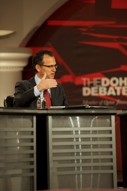 PAUL SALEM
PAUL SALEM
Yes. I agree, I think, with the questioner that you cannot trust any government. It's not a matter of trust - they're all out for their own interests, including Egypt, Tunisia and anybody else that might intervene. And you correctly point out that Western countries also have a huge interest in Libya and other places - security and oil and other things. And the invasion of Iraq was largely about oil, and other invasions as well are about geostrategy and other interests. So I think what we're talking about here is that, given that it's not a matter of trusting so much as the responsibility of states in the region and internationally who have committed to the principle of humanitarian intervention. The Arab states took the lead in saying this is a case where humanitarian intervention is required. It is correct, it was a case where the intervention was required. The Arab states should have put their money where their mouth was, taken the lead and brought the international community with them, and there should be Arab soldiers, or Arab whatever; I'm not a military expert, participating in protecting the Libyan people. And they should not be standing back and criticising others who are doing it.
TIM SEBASTIAN
You really see a time when that can happen?
PAUL SALEM
I think it happened in Kuwait. It could have happened. It still could happen in the coming weeks if decisions are made differently.
OMAR ASHOUR
With Western pressure in Kuwait! There was a lot of Western pressure.
TIM SEBASTIAN
Okay, I'm going to take a question from the gentleman in the front row, if we can get a microphone to you. It's just behind you. If you can tell us where you're from, please.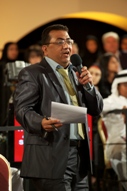 AUDIENCE (M)
AUDIENCE (M)
I am Egyptian. In the last Gulf War the great Islamic intellectual Mohammad Ghazali was asking about the existence of the Coalition forces of the United Nations in the Gulf. He said, "I am not annoyed by their existence but I am annoyed by our absence." The Arab League are now like inert gases: they're non-reactive and non...
TIM SEBASTIAN
Okay, do you have a question?
AUDIENCE (M)
How can we change the role of the Arab League? That's what I'm asking about.
TIM SEBASTIAN
Mohammed Ali Abdallah, do you want to take that?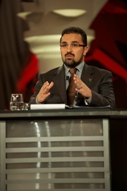 MOHAMMED ALI ABDALLAH
MOHAMMED ALI ABDALLAH
Yeah. First of all, I think we need to keep the discussion in context here. It's not a matter of whether there should be intervention or not, okay; it's a definition of who should have taken the lead and the position? And to answer your question, I agree with you: I don't think Arab League is the proper mechanism to actually drive this intervention into Libya, but I think it was the right mechanism to take the position. And in the Arab League meeting, if it was not for the pressure within the Arab states led by the GCC, thanks to Qatar, UAE and other countries, that drove this message, the Arab League position would have never happened. So that's...
TIM SEBASTIAN
So what is the mechanism for driving this intervention?
MOHAMMED ALI ABDALLAH
The proper mechanism has to be individual countries. And the intervention is a military intervention. This is no military coordination at Arab level. I think Egypt should have been the leader to take that position. 1.3 million military personnel, 468,000 of them active with the Egyptian military power that they have, they could have intervened and taken a leadership role. That does not mean, as my colleague Paul said, that the rest of the world has no role. Everybody has a role, but the Arab countries should have led that.
TIM SEBASTIAN
Okay, right. Fadel Lamen, do you want to come in on this?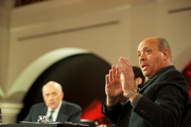 FADEL LAMEN
FADEL LAMEN
Two things I would like to mention. First, I'd like to mention to the gentleman there that the word `interest' is not a dirty word. Everybody has an interest. He has an interest too, in other things, and I think he participates and looks at things from his own interest. `Interest' is not a bad word. So when we say ‘Western interests': there are Arab interests, there are individual interests. So we have to keep the word ‘interest' as not a bad word.
TIM SEBASTIAN
Well, we're talking more about responsibilities here.
FADEL LAMEN
We're talking about responsibilities. Everybody has an interest. With interest there is a moral obligation, there is a preferred view of the world - like, democracy is better than dictatorship. Democratic countries, they don't fight each other.
TIM SEBASTIAN
And taking responsibility for your own revolution is better than pulling somebody else in?
FADEL LAMEN
That's true. But let me go to the Arab League. The Arab countries are not qualified yet and they are not ready yet to assume this kind of responsibility. Because they cannot...
PAUL SALEM
I think that's a mistake. These arguments are askew.
FADEL LAMEN
And let me mention something. We mentioned...
TIM SEBASTIAN
I think you've got some resistance, actually. I can see a few shaking heads in the room! So, yeah.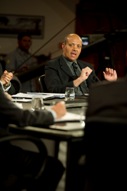 FADEL LAMEN
FADEL LAMEN
Yeah, but Paul mentioned Kuwait. Kuwait is an invasion of one country to the other. We are talking here about intervening within a country itself. That had...
PAUL SALEM
But the Arab League already said that.
FADEL LAMEN
They should.
PAUL SALEM
They already called for the intervention.
FADEL LAMEN
They should. 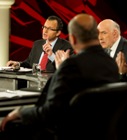 PAUL SALEM
PAUL SALEM
Then they are nothing! If they weren't going to do anything I shouldn't have said anything.
FADEL LAMEN
The Arab League and our countries are not qualified yet, and they are not ready for this. Hopefully in the future.
MOHAMMED ALI ABDALLAH
Fadel, I think the argument being made against it, I think, is based on traditional paradigms and the traditional way of behaviour in the Arab League and the Arab states in the past. And I think the whole point here is that these revolutions that are happening in the region are shifting the paradigms. This was an opportunity to shift the paradigm at a regional level that was...
FADEL LAMEN
Okay. And...
TIM SEBASTIAN
I'm going to take a view from the audience. There was a lady in the second row who was shaking her head wildly. We'll get a microphone to you. If you just stand up and give us your point of view there, please.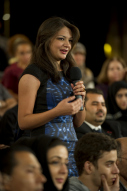 AUDIENCE (F)
AUDIENCE (F)
Sure. Good evening. I'm from Iraq. Well, for your comment, you keep on saying we cannot - Arabs always disappoint us, dictators and so forth and so forth. I don't want to repeat what you said. But, sir, when are we going to take a step forward and actually trust the Arab League? We need to change. You can see too many revolutions are happening in the Arab world. So don't you see that this is some kind of a hope? And us, the youth, we are the next generation's leaders. So don't you..
TIM SEBASTIAN
So you want NATO to stay out of Libya?
AUDIENCE (F)
Of course Arabs should never stay out of this. Arabs should be a part of this. We have to deal with our own problem, not somebody coming all the way from past the Pacific and solving our problems! No, sir, I believe.
TIM SEBASTIAN
Omar Ashour, do you want to answer?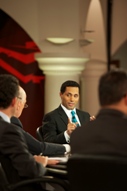 OMAR ASHOUR
OMAR ASHOUR
Absolutely, I agree with you about the revolutions, that this is time for change and this is time for moving towards a serious democratic transition in the Arab world that was really delayed for a while. But right now, all the revolutions that happen in the Arab world, especially the Egyptians and Tunisians, they are not there yet. They do not realise their potential yet. We still are working on it. And ask anyone in the Arab revolutionary movement in Egypt or in Tunisia they will let you know that. The other thing is that we really did not - this became a matter of urgency. Al-Gaddafi managed to turn a civic resistance campaign, an unarmed one, into a fully-fledged armed conflict that he had the upper hand. Because there was no other way for him to win this. He can win it only by violence. If he goes to elections, he'll go down. If he goes for referendum, he'll go down. So the only way to stay in power was to massacre his own people. And his own people asked...
TIM SEBASTIAN
Yes, but I don't think she's convinced by the answer. I don't think she's convinced at all by that.. Let me just go back to the questioner here, please.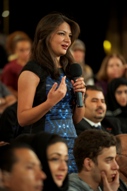 AUDIENCE (F)
AUDIENCE (F)
Sir, well, as you said over and over again, you have Qatar, UAE - you have too many Arab countries are willing to help, more than willing to help. Why do you always have to shut that door down and say "No, Arabs cannot take care of it"? As the doctor, Mr Paul, I believe, he said why can't Arabs work with NATO - why can't you open that door that we can help out and work together? Why do we always have to say "No, no, Arabs cannot do that"?
TIM SEBASTIAN
Fadel Lamen, do you want to answer that one?
FADEL LAMEN
Let me say something. First, when people like you,younger people, people who believe in democracy and human rights, will be leading these Arab regimes, I will defer to you; I will not call any other intervention. Right now we are not dealing with that. We are dealing with regimes that are ruled by people who are looking for their own interests and their own survival, and we are looking at that. The other thing is I think there is a difference between leading and participating. I think right now it's the challenge and the litmus test for the Arab countries to participate. You cannot lead without participating, you cannot walk before you grow up.
TIM SEBASTIAN
Okay. Paul Salem, you wanted to come in on this.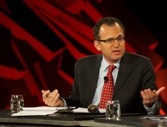 PAUL SALEM
PAUL SALEM
I think the timing is key. I mean, we are in a revolutionary moment in the Arab world that comes once in a century or once in a millennium. The Libyan people rose up in response to revolutions in Egypt and Tunisia and other parts of the world. This is the time to act! And as the populations we have let our regimes off the hook if we tell them, "No, you're not ready yet to intervene. You don't have to act in support of other people." I think, like my colleague was saying, that we in these types of debates, demonstrators in other parts of the Arab world, should be pressing their governments. Yes, their military, yes, their transition has not taken place. But like they press their regimes to get rid of corrupt officials, to get rid of intelligence agents, they should push them to help the Libyan people. It's a matter of will. And to say that "No, we can't" and that the regimes, with billions of dollars, cannot do anything in Libya - no, they can!
TIM SEBASTIAN
Okay, all right. I'm going to take a question from the lady in the second row, if we can get a microphone to you.  AUDIENCE (F)
AUDIENCE (F)
I am a Qatari. Actually I think the situation in Libya is so weak that it puts us in a bewildering situation. It's neither or nor, in my opinion. Actually as a principle Arabs should intervene. But are they ready? What do we expect from Arabs, especially at this turning point when most of the countries witness the same fate as Libya is having now - can they be organised and united? We hope in the future they might. Now, if...
TIM SEBASTIAN
So they should be? Would you come to a question, please?
AUDIENCE (F)
The question is: if NATO is to intervene, I ask the opposition and proposition what are the consequences: are we likely to witness a colonisation of any sort? What is the price Libya is going to pay or the Arabs? Thank you.
TIM SEBASTIAN
Okay. Omar Ashour.
OMAR ASHOUR
There are no boots on the ground. I don't think the Western world..
TIM SEBASTIAN
Yet.
OMAR ASHOUR
Yet. But it was quite obvious among all the Western politicians, all the Coalition, they were pretty much strict about the idea of boots on the ground.
TIM SEBASTIAN
You believe them?
OMAR ASHOUR
For now, it is obviously in their interest not to put boots on the ground if they want to stay in power, because there are elections and this will damage them, for sure. We have a problem for just maintaining a 24-hours air patrolling of Libya skies, because there is not enough airforce. So the idea of an invasion in Libya, I don't think that will happen at any time.
TIM SEBASTIAN
So the question was: what price is Libya going to pay for this NATO intervention?
OMAR ASHOUR
It will probably be very much attentive. Gaddafi was a `free radical', if you wish: like, he did not have - that's why Arabs don't have much tools to pressure him. But I think at a later stage there will be very attentive ears to the Western powers later on. This can be positive on issues like democracy and others, and can be negative on other dimensions, as well.
TIM SEBASTIAN
Let me go back to you. What price do you think Libya's going to have to pay?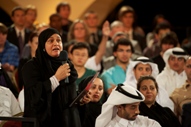 AUDIENCE (F)
AUDIENCE (F)
First of all, the economic trend. There could be some kind of, I don't know, agreement or intervention in that. Education in Libya, things like that. We know it's retarded, to way beyond what it should be, but this is what al-Gaddafi's regime brought to them. So we don't need more agony inflicted on them. We need them to develop and proceed.
TIM SEBASTIAN
All right, thank you. Mohammed Ali Abdallah.
MOHAMMED ALI ABDALLAH
Yeah. I mean, the whole idea of if the intervention was led by Arabs the casualties would be more, the result would be catastrophic, I think would be correct if it was only Arabs, okay. And I think what we're calling for is Arab leadership. And one of the sort of misnomers that people think is that this is all about air strikes and all about no-fly zones.
TIM SEBASTIAN
You really think NATO would come in and take part in a force with Arab leadership?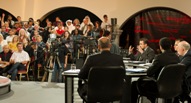 MOHAMMED ALI ABDALLAH
MOHAMMED ALI ABDALLAH
I think maybe not NATO but other Western countries would. And I think if it was... And I think the reason why the UN waited for the Arab League to take a position was to legitimise their decisions back home in their own states, as Paul mentioned. Because these are election times, and I think beyond that it would have been every more legitimate. Now, the other important point to mention here...
OMAR ASHOUR
You should join us at this point, because the motion is Arab versus NATO, so!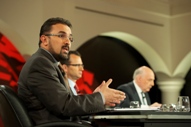 MOHAMMED ALI ABDALLAH
MOHAMMED ALI ABDALLAH
Yeah, but the Arabs to lead it. And I think that's the motion I'm standing by! This is the position that we're standing by. And I think the idea that it's all about the fly zone, and about the air, I think that history right now is proving wrong. Until today - today in Misrata and in Zintan in the western mountains people are being killed. Are they being killed by air strikes? No, they're being killed by reinforcements arriving into Libya from Arab states and from the Arab borders. Now, if these Arab states intervened to prevent these reinforcements from coming, there could have been additional lives saved. There could have been additional lives saved, and this is why..
TIM SEBASTIAN
Okay, just going to let Fadel Lamen have a say. Let Fadel Lamen have a say.
FADEL LAMEM
That is they're providing support for Gaddafi, I don't want them to intervene as in Libya.
MOHAMMED ALI ABDALLAH
No, it's not one size fits all! It's not one size fits all.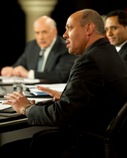 FADEL LAMEN
FADEL LAMEN
Hold on. No, please. Let me say I think it's a moment, as Paul would say, it's a moment for Arabs to show that they can lead by participating. They are not qualified to lead right now. And I am an Arab, and I have no problem with that. We have to understand our reality. We are not qualified morally that we are providing that kind of level...
MOHAMMED ALI ABDALLAH
Who holds the morality stake? Who holds the morality stake?
FADEL LAMEN
Hold on. We are not providing, because..
MOHAMMED ALI ABDALLAH
You think NATO has the morality stake, you know?
FADEL LAMEN
Hold on. No, no, hold on.
TIM SEBASTIAN
Please, don't all speak at once.
FADEL LAMEN
Countries that are oppressing their own people. I'm not talking about Egypt and I'm not talking about Tunisia.
MOHAMMED ALI ABDALLAH
They are Arab states - so we have to talk about them!
FADEL LAMEN
Hold on! These are countries going through their own transition. They cannot help. And I will not ask anything of them, because they are susceptible to possibly a terrorist activity by Gaddafi himself. So we have to understand the reality of the Arab world as is, not the reality of the Arab world as we'd like to see it - that's in the future.
TIM SEBASTIAN
Okay. I'd like to hear from somebody from Libya. Can anybody who's from Libya, would you raise your hands? A gentleman in the front row. Do you want to give us a short opinion on what you've heard so far?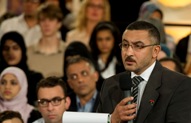 AUDIENCE (M)
AUDIENCE (M)
Thank you very much. I'm from Libya. Mr Mohammed, I think he just shot down his motion by stating that some troops coming from Arabic countries to fight with Gaddafi. So thank you very much for making that statement. Also the National Front as the prominent Libyan opposition, it's not really prominent Libyan opposition. I wanted to make this statement very clear to the audience here.
TIM SEBASTIAN
You're saying there's no Libyan force capable of doing?
AUDIENCE (M)
Sorry?
TIM SEBASTIAN
There is no Libyan force capable of helping, no opposition Libyan force capable of this?
AUDIENCE (M)
No, no, I'm saying the National Front is not really a prominent Libyan opposition party. So I just wanted to make this point clear.
TIM SEBASTIAN
Okay. All right.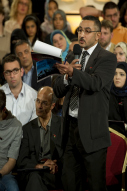 AUDIENCE (M)
AUDIENCE (M)
Okay. The issue now: Libyans are really capable of defending themselves. So all that we need is just to arm the Libyans. We are really agonist, bringing troops from outside to inside Libya. But all we need is from the United Nations - not really NATO, because NATO have proven not to be really credible. We need the United Nations or the coalition between the US, UK and France to come back again and defend the Libyan civilians, and arm Libya. That's what we need.
TIM SEBASTIAN
Okay, all right. I'm going to take another view from somebody who's from Libya. Somebody from Libya? A gentleman behind you.
AUDIENCE (M)
Good evening. I'm from Libya.
TIM SEBASTIAN
Very briefly. Very briefly.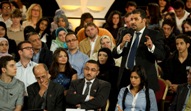 AUDIENCE (M)
AUDIENCE (M)
As we speak there are kids dying now today, families, elderly, all people. Now, the point I'm making - and my question is at the end of the comment: neither can do the job. The sluggish operation of NATO, sending the wrong message to Gaddafi troops to go even harder. This is Number 1. The Arabs, I don't think they have anything to offer, with a few exceptions. There's no democracy. With a handful of countries they probably have a democracy - I'm saying just a handful, probably two or three at the max. And I should take this opportunity to thank and be thankful to the Qatar government, to the Qatar people, for helping Libyans very much. I should say thank you very much!
TIM SEBASTIAN
Okay. So faced with the question of whether Arabs or NATO should be doing the job in Libya?
AUDIENCE (M)
Actually it's a responsibility for everybody.
TIM SEBASTIAN
Okay, all right. Let me give the microphone to somebody else from Libya. A gentleman in the front row. A quick comment from you. Where do you stand?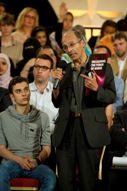 AUDIENCE (M)
AUDIENCE (M)
I'm from Libya, living in London. I'm having a real problem with this particular debate, because in real terms I cannot see the Arab world in any way being able to deliver. On the other hand I think...
TIM SEBASTIAN
Do you think they should be able to deliver?
AUDIENCE (M)
Of course they should, but there is no way they can do it in practical terms. And in reality we have people being killed day by day. So the only alternative we have now is to get this NATO thing going on. Now, like somebody has said, the issue, the problem lies with the United Nations and with the mechanism that the United Nations has in sorting out issues like these.
TIM SEBASTIAN
Okay, all right.
AUDIENCE (M)
And just one important issue. What Fadel has said about interest is not a bad word, I totally agree with him. I think there is a big problem here between the East and the West. And the issue is a mistrust and misunderstanding. I think we are all responsible for this, both Arabs and Muslims and the West as well. And I think right now there is a new thinking going on, that the West have realised that ignoring promoting real democracy in the Arab world in the past did not pay off and they are better off doing this by actually supporting democracy in the Arab world, because it's going to sort out our problems. Thank you.
TIM SEBASTIAN
Okay, all right. Please, we've got a lot of views that I want to hear. I want to take one more from somebody from Libya. A lady in the front row. You're from Libya? Okay. Can we get a microphone to you, please. A very quick view, please.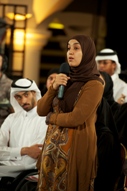 AUDIENCE (F)
AUDIENCE (F)
I'm from Misrata, Libya. And as the gentlemen have said, although I think all Libyans in an ideal situation would have loved to see Arabs take leadership in, you know, this fight against Gaddafi, we haven't seen any means or any realistic - you know. We waited a month. The Libyan people were crying for help for one month, and NATO decided to step in and help. But if we had waited for the Arabs to actually take a stance and do something, I think that we would have seen a lot more destruction and a lot more deaths.
TIM SEBASTIAN
Would you have trusted an Arab force if they had come into Libya?
AUDIENCE (F)
I don't think so. Based on history, I don't think that there was an Arab force that was capable of coming in and stopping Gaddafi. Like I said, ideally I wish, you know, we could have trusted an Arab to come in and do the job, but realistically I don't think it was possible.
TIM SEBASTIAN
Paul Salem, how do you react to that?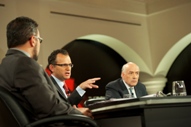 PAUL SALEM
PAUL SALEM
Well, I mean, I understand the hesitation about trusting the Arab governments, as one would not also be able to trust other armies and other governments, whether they're occupying Iraq or other places. But the Arab countries and Arab people and different officials did take positions. In the Security Council it was the Lebanese ambassador, a friend of mine, Nawaf Salam, who drafted the first action and got the Security Council working. It was the GCC and the Arab League and others that made the public voice for the intervention and convinced a lot in the Security Council that there is support for this. So that was very important. My problem was, after doing all of that, they then asked Western taxpayers, Western young boys to pay their money, risk their lives, to protect our brothers in Libya. I think as we took the lead in tabling the motion and calling for it internationally, there should have been Arab leadership, Arab participation through the Security Council. We are all founding members of the United Nations. We're not a separate entity. But to do all of that and then to step aside and say we are simply asking Western Europeans and Americans to spend their money and risk their lives is, to my mind, completely unacceptable. I don't trust the US army, and I don't trust the French army, and I don't trust the Italian prime minister. This is not a matter of that. [Applause]
MAN
I agree with you!
TIM SEBASTIAN (to questioner)
Okay, you wanted to come back. Please stand up. AUDIENCE (F)
AUDIENCE (F)
I don't think that the Libyan people necessarily trust them either, but we were not left with an option. And I mean, okay, you know, Egypt has a large military, but they're still dealing with the aftermaths of their revolution. Was it fair for us to ask them to take a strong stand and send troops to Libya? I don't think that is really a realistic situation.
MOHAMMED ALI ABDALLAH
I think we could have asked - yes, I think there is no ideal scenario, as we mentioned. Okay, so there is no ideal scenario of who would be the right person to intervene. Like you mentioned, in Misrata there are people dying right now. If even the Israeli army would have come to intervene to save lives, it would be very difficult morally for anyone to argue against that intervention. So that's not the point of this discussion and it's not the point of the debate.
TIM SEBASTIAN
Okay. Fadel Lamen.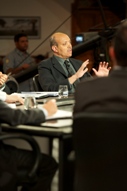 FADEL LAMEN
FADEL LAMEN
I just want to mention: for people who want even the Egyptians to intervene, and they have a problem with the word `interest', Egyptians have their own interests too as a country in the region. So I mean, if they intervene...
MOHAMMED ALI ABDALLAH
As long as their interest doesn't interfere.
FADEL LAMEN
What I'm saying: I'm going back to the point that the Arab countries, as you mentioned, they took the lead, the GCC. Great - they did a great job. That's diplomatic. I applaud the Lebanese representative at the United Nation. He did a great job. But we are talking about NATO. NATO is a military alliance: meaning do we want a military intervention by the Arabs or a military intervention by the West? Because we are not talking about diplomacy here; we are talking about force. And there is no credible force. The Arab League does not have a striking force. So we don't have any choice to choose between Arab force and the northern alliance, the NATO. And that's what happened.
TIM SEBASTIAN
Okay, all right. Briefly, please.
OMAR ASHOUR
Okay. Even without the military dimension, even politically, what kind of pressure tools that the Arab have on Gaddafi? Gaddafi went towards Africa a long time ago.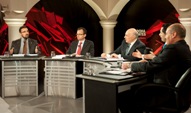 MOHAMMED ALI ABDALLAH
MOHAMMED ALI ABDALLAH
Well, even the West doesn't have it, obviously.
OMAR ASHOUR
No, they have some political clout, but principally a military clout.
MOHAMMED ALI ABDALLAH
Where?
TIM SEBASTIAN
Okay, I'm going to take a question. A gentleman at the back. 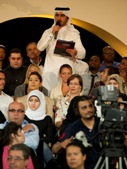 AUDIENCE (M)
AUDIENCE (M)
Okay, thank you very much. My question for the opposite side: we all know, of course, that the Arab League countries have problems, emergency problems or problems from the government. But logically, when somebody has a fire in his house he doesn't call the neighbour and tell them, "Come first." He has to be the leader in his house. Because this fire is a risk, and this will come to you. And all of us know that Gaddafi now has so many militias, they could do any terrorist things in all Arab countries. So why we don't be the leader to make Gaddafi out?
TIM SEBASTIAN
Omar Ashour, please take that point.
OMAR ASHOUR
Because I wish the Arabs had intervened from the very beginning. I wish the Arab world was a democracy and had these humanitarian ideals to help the brothers in Libya. Whether the will is there? No. The capacity is there? No. The credentials are there, and we have to really separate between the Arab people, with their potential, with their hopes, with their pains, and the regimes that are mostly in control of these Arab states and not necessarily represent their will or their potential. So we're faced with this crisis in the Arab world. Obviously the revolutions are changing this ugly face, but they're not mature yet. The revolutionaries, again, we don't have a democratic Egypt right now. We're in the process of democratisation. The same thing with Tunisia...
TIM SEBASTIAN
Let him come back - he wants to make another point.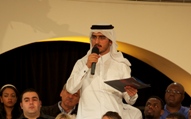 AUDIENCE (M)
AUDIENCE (M)
Maybe Gaddafi, if we take out Gaddafi, the revolution will continue in the Arab countries. But now Gaddafi is maybe a big rock in the rock of revolution.
OMAR ASHOUR
That's true. That's why we need an effective tool to remove him from Libya. Because if Gaddafi survived, I think it would be a disaster for other revolutions in the Arab world. Because many of the regimes will be thinking: "Gaddafi survived by massacring his own people. Maybe we will survive as well by doing so."
AUDIENCE (M)
Okay, thank you. But please...
TIM SEBASTIAN
All right, okay. Please, no, we've got a lot of questions, and you've had one. Thank you. Can I take the lady who's just two rows in front of you? 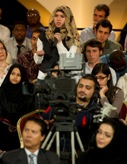 AUDIENCE (F)
AUDIENCE (F)
Good evening. I'm from Lebanon. My question is for the opposition in general and for some of the people in the audience tonight. I know it's essential to be realistic when you're talking about this and when you evaluate the ability of the Arabs to handle the situation. But don't you think that it's also part of reality, all these revolutions that are happening? I mean, who would have thought that the Arabs would one day stand up and take this stance? So I think it's only a matter of time until the Arabs are actually able to do it. I mean, the will is there. And as a young person, as a young Arab, I truly believe that we're going to get to the point where we're going to be able to take care of this by ourselves.
TIM SEBASTIAN
Okay, I'm going to take a comment from a lady in the second row. Yes, you, with the pink scarf.
AUDIENCE (F)
Okay. So I'm going to state something and then I'm going to go on to my question. First of all..
TIM SEBASTIAN
Do one or the other, okay! [Laughter] Do one or the other!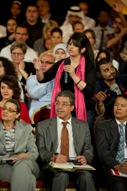 AUDIENCE (F)
AUDIENCE (F)
I would like to state that I do have a problem with the word `interest', because we're not talking about the individual interest; we're talking of political parties' interest. And we're not just talking about me being interested in hardball or swimming; we're talking about them being interested which will many millions will be under a consequence of this. Many people will suffer from your interests.
TIM SEBASTIAN
So what is your problem? Relate that to Libya.
AUDIENCE (F)
My problem is that `interest' is not a good word here, because many people are suffering from the interests of a certain party. And my question is whether, even though like the Arab world has risen after thirty years to come to this revolution, doesn't qualify you, with all due respect, sir, or I, to state that the Arabs aren't morally qualified to come and lead this world today.
TIM SEBASTIAN
Well, in the context of a debate people are entitled to their opinions! Fadel Lamen.
FADEL LAMEN
When I speak about the Arabs here, I'm speaking about the regimes, entities. I'm not speaking about individual Arab, because I am an Arab, you're an Arab, and the others. And Arabs don't have the moral pedigree on their own, so people are moral unless proven otherwise. The issue is not with the problem of interest. The Arabs always have a problem with the issue of conspiracy. "Yeah, there is a conspiracy behind this. There is a conspiracy behind that." And you know what my response is? If everybody else has a conspiracy, where is your own conspiracy? You have to have your own. So don't be afraid that other people have interests. The question is do you have an interest? How do you define this interest? Are you going to be able to protect your interest? Are you going to be able to communicate in the world with your interest? So...
TIM SEBASTIAN
Okay, you want to come back and make a brief point. Excuse me, she wants to make a point. She's coming back.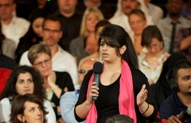 AUDIENCE (F)
AUDIENCE (F)
Sir, that's the problem here: that the citizens, millions of citizens, aren't having the right to speak up to talk - only leaders, only dictators are heard who are stating their interests. Other citizens, even though have individual interests, do not have the right to speak it up!
FADEL LAMEN
That's why we're happy to have this uprising. And there are two things happening. We are looking at an uprising that will change the Arab world - which is a very good thing, hopefully, insha'Allah! Okay, there is another thing that...
TIM SEBASTIAN
Okay, all right. Just make one brief point and then I'm going to move on.
FADEL LAMEN
Okay. Yeah, the other thing is that the Arab League leading with the resolution, it's a beginning. So I'm hoping from this we will see an evolution of the Arab League to do more things, better things, in the future.
MOHAMMED ALI ABDALLAH
So you agree that they should lead, then? [laughs]
FADEL LAMEN
Not leading, no.
TIM SEBASTIAN
Okay, I'm going to take some questions for this side of the House, those who are for the motion. Who has a question for this side of the House, for those who are for the motion? A gentleman in the second row.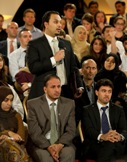 AUDIENCE (M)
AUDIENCE (M)
Hello, I'm from Benghazi, Libya. My question is for Mr. Mohammed. Looking at the problems that NATO's actually facing right now in Libya, do you think by having an Arab-led military action would they do anything better? That's my question.
MOHAMMED ALI ABDALLAH
Okay. To answer your question, yes, I think there needs to be more involvement from the Arab countries, especially on the ground. Okay, I'm not talking about ground troops only, but I think mainly on the border, reinforcing the borders, I think with supplying the revolutionary forces also to defend the civilians. These are some practical steps that could have helped. Now, NATO alone obviously is not able to do enough job, and I think whether you can take NATO out and put any, any party in there alone would never be able to fully handle the situation. So, like we said all along, there needs to be many people involved. The leadership needs to be maintained locally. The closer the proximity is to the problem, the better the leadership will be. And this is the position that we are trying to defend.
TIM SEBASTIAN
Okay. Let me just go back to the questioner, please, if you would stand up. You're from Benghazi.
AUDIENCE (M)
Yes.
TIM SEBASTIAN
Where are you on this issue - would you trust an Arab force to go in? Do you think an Arab force is capable of going in?
AUDIENCE (M)
Not really, no. To have some role, yes, but I don't think they should lead, to tell you the truth. If you look at them militarily, I don't think they have the capability to lead.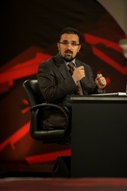 MOHAMMED ALI ABDALLAH
MOHAMMED ALI ABDALLAH
Well, that's an interesting point you raise, because I did a quick study with some of the military people from Egypt, okay. And, well, you can talk about many Arab countries about this: the billions of dollars spent on military weapons and the millions of people who are in the forces. Traditionally these have been weapons that have rusted. They filled somebody's pockets - in a Western country, typically, that they bought these weapons from. And these weapons are typically used against their own people, as is the case today in Libya. Okay, so I think it's time to use those weapons. You have special force units.
TIM SEBASTIAN
Isn't it a matter of trust, isn't this what you're talking about? Not whether the Arab states have the hardware but whether the people of Benghazi, your people, would trust them?
AUDIENCE (M)
I think it's both. As far as militarily, I mean, NATO - how much billions that NATO has in military hardware and they're not doing the job, to tell you the truth.
MOHAMMED ALI ABDALLAH
It's fractions compared to what the Arab countries have. It's fractions.
OMAR ASHOUR
There was an Arab deterrent force before in Lebanon - I think its case was a disaster! So repeating this in Libya, I think it would be highly..
MOHAMMED ALI ABDALLAH
No, it's not a comparison. It's not a comparison. Libya is not a comparison.
OMAR ASHOUR
Well, where else can you go for comparisons? You can compare on historical points.
MOHAMMED ALI ABDALLAH
There is no - that's a good point, okay. That's a good point.
TIM SEBASTIAN
Let the questioner have a point.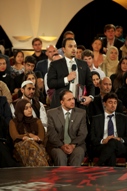 AUDIENCE (M)
AUDIENCE (M)
I mean, logically if we look at it, okay, yes, there is billions spent and all that. But are they capable to intervene in the political situation they have right now? I mean, I think it's very tough, even if they have all the weapons in the world, if you don't have your things straightened up in your own country you won't be able to help anybody else.
TIM SEBASTIAN
And even though the rebels aren't very happy with what NATO is doing at the moment, they want much more done, you'd still stick with NATO, would you?
AUDIENCE (M)
Yes.
TIM SEBASTIAN
Okay. A gentleman in the second row.
AUDIENCE (M)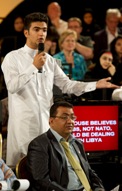 Hi, I'm from Syria. I just wanted to clarify a point first, and then I'm going to move to my own question for the opposition. First, when you are saying you don't trust Arab force when we are helping you or helping Libya, that's because we are Arabs, we are brothers. But when America and NATO are trying to solve the problem, that's because for their own benefits. But moving to my own question for the opposition...
Hi, I'm from Syria. I just wanted to clarify a point first, and then I'm going to move to my own question for the opposition. First, when you are saying you don't trust Arab force when we are helping you or helping Libya, that's because we are Arabs, we are brothers. But when America and NATO are trying to solve the problem, that's because for their own benefits. But moving to my own question for the opposition...
TIM SEBASTIAN
I just want to ask you whether you felt like brothers when Libya was being repressed by Colonel Gaddafi. Did you feel like helping them then?
AUDIENCE (M)
[Laughs] Yeah! But... [Audience laughter] But now I'm going to move to my own point.
TIM SEBASTIAN
You're not going to answer that question, are you! [Laughter]
AUDIENCE (M)
No! [laughs]
TIM SEBASTIAN
No! Okay, all right! I just wanted to place that on record that you didn't want to answer it!
AUDIENCE (M)
Okay, I'm going to move to my own point.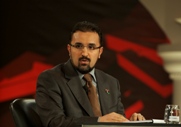 MOHAMMED ALI ABDALLAH
MOHAMMED ALI ABDALLAH
Neither did the Western world, by the way. Neither did the Western world. [Applause] So the same people that were intervening today, they were watching when Gaddafi was killing the Libyans for 42 years!
TIM SEBASTIAN
Absolutely! So this is the question to you: shouldn't NATO be picking up the pieces?
MOHAMMED ALI ABDALLAH
They should. They have a role to play. They have a role to play. But it's not fair. It's not fair to..
TIM SEBASTIAN
They contributed to the mess - shouldn't they be doing it? You're talking against your side, I think!
MOHAMMED ALI ABDALLAH
No, I'm not, I'm making my point clear! This is nothing... 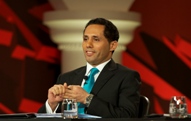 OMAR ASHOUR
OMAR ASHOUR
[Laughing] Let me help Mohammed! They were on the side of the revolutionaries in Egypt; they weren't on the side of the revolutionaries in Tunisia. But they were ...
TIM SEBASTIAN
[Laughs] And then we'll go back to the questioner.
AUDIENCE (M)
Moving on to my question...
MOHAMMED ALI ABDALLAH
They were ... their own interest?
OMAR ASHOUR
They weren't on the side of them until the balance of interest started tilting. And this is when you get really their support. And I think in Libya this is the right time, and it's an emergency situation that you need NATO's intervention at that point.
MOHAMMED ALI ABDALLAH
Mm, yes, they have a role to play! But they should not be leading it.
TIM SEBASTIAN
Okay, let's go back to the poor questioner! 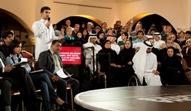 AUDIENCE (M)
AUDIENCE (M)
Yeah, moving to my own question for Mr Fadel: you said that we don't have capabilities even if we want to help them. But we didn't even gather up to solve the problem. But when Qatar tried to gather up and go to help Libya, many blood were about to fall on the ground and Qatar helped that, that the blood would not be able to fall. So do you think now we Arabs don't have capabilities?
FADEL LAMEN
We have the capability to participate - which is a good thing! Guys, why are you so upset at the fact that we used to not be able to participate at all? Now we are participating. "We are going to lead!" Well, just hold on until we're qualified to lead, then we..
MOHAMMED ALI ABDALLAH
No, no, there is no time to hold on. No. There is no time to hold on!
FADEL LAMEN
Hold on. Hold on. Let me finish. Let me finish.
MOHAMMED ALI ABDALLAH
This is a new era! This is a new era! Revolutions happen in weeks! There's not the time to...!
TIM SEBASTIAN
Okay, all right, let him finish. You've made your point. Thank you.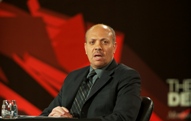 FADEL LAMEN
FADEL LAMEN
Revolutions take time to take root in the country. First, I just wanted to say the issue of why we're calling our brothers: because `we are brothers'. And then `this, the West', you know! It's very wrong to dehumanise the West. It's wrong. [Applause] You don't like to be dehumanised. I think it's very, very important to understand that the West or the East, we are all human. It's a human rights issue. It's human people. And the issue of Libyans: I think when Libyans - I am from Libya and we understand: when Libyans decide to help themselves, everybody came to help them. It took a long time for Libyans to help themselves, to uprise. But when they did, all over the world they received sympathy and support. So we have to look at ourselves: why did the Libyans stay in that situation for a long time?
TIM SEBASTIAN
Okay. Paul Salem. I'm going to bring Paul Salem in.
PAUL SALEM
I fully agree, I mean, that one shouldn't, you know, demonise it - not at all. And I myself thank the West and NATO for intervening, if others were not willing to do so. But to my mind it's very clear that we have an interest. We in this region, like other peoples in other regions, have an interest in building a regional order where we take responsibility first -
FADEL LAMEN
Absolutely.
PAUL SALEM
... for failures that take place in our region. We take the lead as best we can. We offer whatever limited potentials we have. The things that we do not have, we ask our friends in the international community to help us. This is not what we did. We took the lead in asking, and then we played no role in offering what little we have...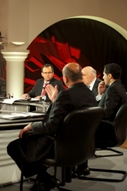 FADEL LAMEN
FADEL LAMEN
Because we can't! Because we can't! Because we can't!
PAUL SALEM
Even though we know that our military - we know we can offer way more than we did. You know it - you know we could have offered much more. We have not done so. We have to decide...
FADEL LAMEN
What could we have offered much more? Every country in the Arab world are dealing with its own problems!
PAUL SALEM
Why could Qatar, this tiny nation, is the only one who can offer planes? The billions that we spent in Egypt, they could not offer anything. You know that's not correct!
FADEL LAMEN
Because Qatar does not have an issue - hold on! Qatar does not have the issue - hold on! Qatar does not have the issue that Saudi Arabia have right now domestically, not have a problem - hold on!
PAUL SALEM
That's not the case. You're saying they could not do it! They can do it! Saudi Arabia has no planes to send?
FADEL LAMEN
No, no!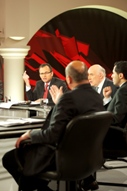 PAUL SALEM
PAUL SALEM
Egypt has no planes to send? That's not true.
FADEL LAMEN
Does not have the problem that the Bahrainis are facing, does not have the problem that the Syrians are facing, does not have the problem the Egyptians are facing. These are realities!
PAUL SALEM
The Egyptians are off the hook...
TIM SEBASTIAN
Okay, I'm going to stop it there, because otherwise you two will argue this point forever! A gentleman in the orange t-shirt, you had your hand up for a long time. 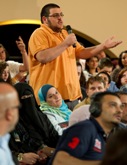 AUDIENCE (M)
AUDIENCE (M)
I'm from Egypt. I just want to ask, with the Arabs in such disarray after all their revolutions, how can they possibly organise themselves in such a short time, when they can't even organise themselves, to help a country that is not their main interest right now?
TIM SEBASTIAN
Ali Abdallah.
MOHAMMED ALI ABDALLAH
I mean, when we state that the Arab countries are in disarray - sitting and waiting for all the disarray to fall and everything to be in order before we actually help ourselves, I don't think that's a realistic mission either. So I assume you don't assume that either. So I think the opportunities are far and few. And this opportunity in Libya to take a leadership role was an opportunity to shift a paradigm - the paradigm of "We are not good enough, we are not capable enough, we don't have enough power, we don't have enough resources". That's an old paradigm we need to get rid of! That's a revolution that needs to happen in our own minds. [Applause]
OMAR ASHOUR
I wish! I wish!
TIM SEBASTIAN
All right. No, no, I'm sorry, I'm going to move on because we've discussed... I'm going to take a question from the gentleman up there. You've had your hand up for a very long time. Thank you.
OMAR ASHOUR
That gentleman's had two hands up for a long time! [laughs]
TIM SEBASTIAN
Yeah, he's got two hands! I'll go with one! Thank you.
AUDIENCE (M)
I am an Arab. I've always been taught...
TIM SEBASTIAN
Where are you from?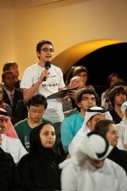 AUDIENCE (M)
AUDIENCE (M)
Syria. I've always been taught that there's no such thing as a free lunch. If we go back in history we find that NATO and the West did not intervene in Afghanistan and Iraq to spread democracy and etc., but in fact they entered it for their economical benefits - oil. So I don't believe as Arabs we have to repeat this mistake again in Libya. But I know as an Arab that if I extend my hand and I do anything to another Arab, I would do it for their benefit - because we Arabs are one big nation. We are one country. [Applause] But regardless of what has happened in the Arab world in 1916 of Sykes-Picot, we are still one big country, one Arab country. So we should all put our hands together.
TIM SEBASTIAN
Thank you. Okay. I'm going to take a view from that gentleman there - you've had your hand up for a while as well.
AUDIENCE (M)
Although it's very easy and comfortable...
TIM SEBASTIAN
Excuse me, where are you from?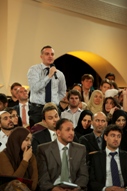 AUDIENCE (M)
AUDIENCE (M)
I'm Polish. Although it's politically very comfortable to talk about political leadership etc. and whether we do have interests or we don't have interests, I believe there no political action that is without some sort of an interest. But what we're facing at the moment is a humanitarian crisis, and that's what we should be... In the face of a humanitarian crisis can we still talk about pretty much futile Arab leadership? We clearly see that the Arab world did not really stand up to the task, even the situation with Amr Moussa. There was a clear shift. And there is clearly no understanding of whether we do anything or we don't do anything.
TIM SEBASTIAN
All right. Paul Salem, you want to answer.
PAUL SALEM
I mean, the question is should they have? That's all we're saying. Yes, they should! And to say the West is not going through financial...
AUDIENCE (M)
Yes, but at the same time..
TIM SEBASTIAN
Not just they can, to coin another phrase.
PAUL SALEM
They did!
AUDIENCE (M)
But at the same time, isn't it pretty much futile to talk about whether they should or shouldn't where you have a crisis that the Arabs simply cannot deal with. They don't have the capability.
PAUL SALEM
They could have dealt with it but they didn't.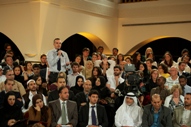 AUDIENCE (M)
AUDIENCE (M)
Well, they don't have the capabilities and they clearly have no political will, unified political will to deal with that.
TIM SEBASTIAN
Isn't it a question of will? I mean, they certainly have the money, don't they?
PAUL SALEM
Well, it's certainly a question of will. And it's not a question of disarray. The West has enormous problems - as you well know! I mean, economic and security. Are they free and are they in such unity that they're the easy ones that can do this? This is a distant issue for them, not as much as ....
TIM SEBASTIAN
But isn't it that the Arabs could if they want to?
PAUL SALEM
Yes, it's difficult. Yes, they're..
TIM SEBASTIAN
They don't want to, do they.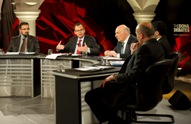 PAUL SALEM
PAUL SALEM
The regimes do not want to, but we are saying they should! We are pushing in that direction.
FADEL LAMEN
The regimes don't have the mechanism in the Arab world to do these kind of things.
PAUL SALEM
The mechanism is ... requirement...
MOHAMMED ALI ABDALLAH
That's not true! The mechanism is there. The whole community is there. The regimes, the dictators that are sitting on top of that, they are the ones preventing it. And as long as we have...
TIM SEBASTIAN
Okay, I'm going to take a question.
OMAR ASHOUR
The reality of the situation: you have regimes that are unwilling because they're not in the centre of it.
MOHAMMED ALI ABDALLAH
And as long as they don't push them, they won't!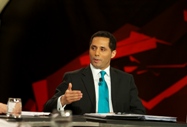 OMAR ASHOUR
OMAR ASHOUR
If we had a democratic transition in the Arab world, if you have democracies in the Arab world, that would be leading interventions, and they will definitely enhance the military capabilities as well, because there will be politicians who would send an army on a humanitarian mission with a very clear objective that this has to succeed, otherwise the politician will fail.
TIM SEBASTIAN
Okay, I'm going to take a question.
OMAR ASHOUR
Because sometimes Nasser pops up in my head now promising huge - giving all these big promises!
TIM SEBASTIAN
Okay, let's leave Nasser out of your head for a moment! Stay with Libya. A lady from Tunisia, you didn't need NATO or the Arabs, did you? AUDIENCE (F)
AUDIENCE (F)
Good evening. I'm from Tunisia. And I have a very simple question. We all know when NATO came to Libya. Does anyone know when they are leaving? And the second question: to what extent can we trust these NATO forces as long as we know that Sarkozy and most of Western leaders were those who made Gaddafi more powerful, and not to mention Tony Blair, Sarkozy or even Berlusconi, who bent at the wrist and kissed his hands! Thank you.
TIM SEBASTIAN
Fadel Lamen. Tony Blair's out of office, actually. But Fadel Lamen.
FADEL LAMEN
Well, when are they leaving? They haven't landed yet, so they're flying, I think, and they're flying not just out of a Libyan airport; they're flying out of the carrier of other airbases.
TIM SEBASTIAN
The question is when are they leaving? The question is when are they leaving.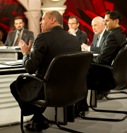 FADEL LAMEN
FADEL LAMEN
So they are flying, and I think they will leave as soon as we want them to leave! The problem is that the Libyans are asking them to do more, because they trust them. It is an issue of trust and capabilities. And I think that's where... Who made Gaddafi? I think that's a larger question. Who helped him? Of course he was helped. And as far as the oil, let's give you a simple piece of information. Any country that has oil, they're not going to drink it. They're going to sell it. So it will always be available on the market. You don't have to go and invade the country for them to get their oil or to buy their oil. So the whole issue about oil, oil, oil does not stand as much when you look at things as they are. Because the oil is in the market. People will buy the oil. People who have the oil, countries have the oil, they will sell their own oil. It's as simple as that. So it's not about oil.
MOHAMMED ALI ABDALLAH
Where does that oil money go after it's sold? And that's the question.
FADEL LAMEN
Ask Gaddafi for that! And I think that's the question!
MOHAMMED ALI ABDALLAH
You could ask him! [Laughs]
TIM SEBASTIAN
Okay, I'm going to take a question from the gentleman with two hands up there!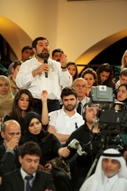 AUDIENCE (M)
AUDIENCE (M)
Thank you. I'm a Lebanese American. I think the dilemma is that the Arabs have the capacity but they don't have the political will or the consensus to lead. And that was proven. The problem we have with NATO, they don't have the moral standing, at least from our point of view - what they did in Afghanistan and what they in Iraq. And in addition, a lot of them were in bed with Gaddafi just a few weeks ago. I'm going to put a question to both to prove my point. Look at Syria now. Hundreds are killed. Right now the Arabs are not moving, and NATO is not moving. The question is: isn't the blood in Syrians as red as the blood of Libyans?
TIM SEBASTIAN
So who would you have move into Syria?
AUDIENCE (M)
I think the Arabs! I think Egypt and Turkey failed big time in helping the Libyans. I think Egypt should have taken the role in leading, but I'm not saying Egypt alone in addition to NATO and otherwise. But I think we failed in this way as Arabs. And we are failing Syria right now, as hundreds are being killed every day! So why the League is not doing anything, and why the Arab world is not doing anything? That's the debate.
TIM SEBASTIAN
Ali Abdallah.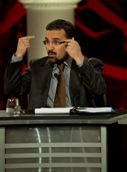 MOHAMMED ALI ABDALLAH
MOHAMMED ALI ABDALLAH
I completely agree with you. I mean, the platform for taking a position and a leadership role in the region was missed in Libya, and hopefully it won't be missed in Syria either. But I'm afraid that the signs so far are not positive. Turkey and Egypt specifically, you mention these two countries, I think missed a huge opportunity - especially Turkey. And I think here we have to put the bigger picture of the Middle East and not just Arab countries, to include Turkey. I think Turkey had two issues here - and one of them has nothing to do with Libya and it's more on the European Union side. They want to pressure themselves and enter the EU on Libyan backs. And this is one of the reasons why we see the position of Turkey as it is today.
OMAR ASHOUR
Well, last time I checked, Turkey is not an Arab country!
MOHAMMED ALI ABDALLAH
Turkey - I said, I put it in context first, so.
OMAR ASHOUR
Aside of that, like what is the ultimate objective really in Libya? We have a humanitarian crisis. It will be resolved. Gaddafi, I think, will be toppled. What do we want after that? Do we want to build a stable democracy in Libya or not?
FADEL LAMEN
Yes.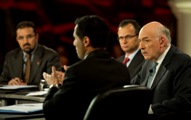 OMAR ASHOUR
OMAR ASHOUR
If there is a stable democracy in Libya, I don't think Saudi Arabia will be able to do it.
MOHAMMED ALI ABDALLAH
No, but Libyans will do it. Libyans are not asking for help to build a stable democracy. Libyans are asking for help to save lives!
OMAR ASHOUR
But when you have interventions, as you know, these cast some influence at a later stage. And when you have free democratic elections, if you're an authoritarian intervener it is less and less likely that any democratic transition will help.
PAUL SALEM
No, you're changing the - you're changing...
PAUL SALEM
The issue was over the no-fly zone. There's nobody's talking about invasion.
OMAR ASHOUR
It's an issue of who would like to deal with Libya, the Arabs or NATO?
MOHAMMED ALI ABDALLAH
As we have so far!
OMAR ASHOUR
I'm saying as an end result, if you want a democratic Libya.
MOHAMMED ALI ABDALLAH
He himself has said that there's no..
TIM SEBASTIAN
You can't all talk at the same time. You can't all talk at the same time.
FADEL LAMEN
Can I say something here? Very quickly. I think there will be an opportunity for Turkey and the Arab countries. Because the way I've seen this conflict from Day One there will be no-fly zones, will be targeting of strategic interests and areas of Gaddafi, and there will be some time of the situation continuing that there will be the need for the boots on the ground. And the question and the challenge for the Arab countries, that these boots - the only places that they have to come from and will be acceptable are from countries in the Arab world. And that will be a litmus test for the Arab countries, and for Turkey, to show that commitment and that lead at that level. And I hope they will deliver.
TIM SEBASTIAN
Okay. All right, we have time for one more question. I'm going to go to that lady over there - you've had your hand up for a long time. 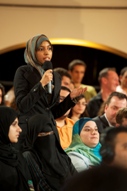 AUDIENCE (F)
AUDIENCE (F)
Hello, I'm from Mauritania, and I have a question for Mr. Abdallah and Mr. Salem. You want Arab countries to intervene in Libya to transition to democracy. But how can you ask them to do that if they don't have democracy themselves in their own countries or anything near that? My question or recommendation is: can you name the countries you're talking about? ‘Arab' is not a whole thing; they are not interconnected themselves - other than Egypt, another Arab country.
MOHAMMED ALI ABDALLAH
I think the intervention was not to help build a democracy. I think Libyans are capable, and more than capable, to build their own democracy. The intervention here was clearly, I mentioned at the beginning, the objectives were to save lives; okay, to prevent Gaddafi's military might that is targeting civilians today. That's it. And that, as far as what countries, I think I mentioned with detail. Egypt was capable to do that. I think to a certain extent Tunisia had a very strategic role to play on the Tunisian border, okay. And I think that Saudi Arabia is another country that could have done more in the intervention in taking the lead. Now, does that mean only them? No, I think there is a role for French, for British, for US, for Spanish, for Sweden, for every single country that did intervene while the Arabs were sitting and watching. And one case, Tunisia - it was a catastrophe.
TIM SEBASTIAN
Okay, I just want her to come back.
AUDIENCE (F)
You mentioned Arab Saudi Arabia, but don't you think Saudi Arabia is afraid of the same thing that happened to Libya to happen in some place? Isn't it paradoxical for it to help Libya?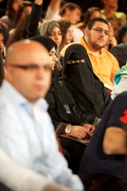 MOHAMMED ALI ABDALLAH
MOHAMMED ALI ABDALLAH
Yeah, but that doesn't justify them not acting. I think this is the thing that...
AUDIENCE (F)
But they won't.
MOHAMMED ALI ABDALLAH
The point is the paradigm of, because..
TIM SEBASTIAN
It may not justify, but it may explain it, yeah?
MOHAMMED ALI ABDALLAH
Yeah, it explains it. Well, it's the reality, yeah. They didn't even offer. And we're not talking about Saudi Arabia specifically, but in general the position we are discussing and we are debating is it's a position, it's a stance that we take, okay. I think even a symbolic position, even a symbolic position, if you don't have the capability, just by voicing it, that in itself has a lot of value, it has a lot of resonance.
OMAR ASHOUR
Symbolic positions won't save Misrata people from massacres. Oil will save your people, oil ... people.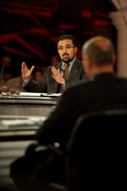 MOHAMMED ALI ABDALLAH
MOHAMMED ALI ABDALLAH
Neither is NATO. Neither is NATO. Neither is NATO. I'm sorry.
OMAR ASHOUR
Well, it is doing - well, it saved Benghazi, for sure!
MOHAMMED ALI ABDALLAH
Five days since NATO struck in Misrata! Five days!
OMAR ASHOUR
It saved the second city in Libya from an imminent massacre, that's for sure.
TIM SEBASTIAN
Okay. Before we move to the vote, I'm just going to ask each of our panellists for a quick sentence to sum up their position, and then we'll go to the vote. Mohammed Ali Abdallah, one quick sentence!
MOHAMMED ALI ABDALLAH
Yeah, quick sentence. I think it's a time for change in the region, and I think that change happens at all levels. We are seeing revolutions at a local level; I think it's time to take revolution to a regional level and into our own positions. We have to have our own revolutions.
TIM SEBASTIAN
Okay, all right. That's more than a sentence! Paul Salem.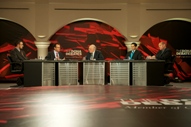 PAUL SALEM
PAUL SALEM
We have primary responsibility to take care of our own issues. We've taken the position. We didn't translate it into action. We should do so with leadership and with the cooperation of the international community.
TIM SEBASTIAN
Omar Ashour.
OMAR ASHOUR
Well, Libya is already paying a high price for its freedom. Please don't ask it to pay a higher price by waiting for incompetent, conflicted and reluctant bureaucracies to save it.
TIM SEBASTIAN
Fadel Lamen. [Applause to Omar Ashour's statement]
FADEL LAMEN
I think that the Arabs have the opportunity to participate. I think through participating in this effort they will be able to lead in the future - and that will be the test, the real test for the Arab world, the Arab countries.
Vote result
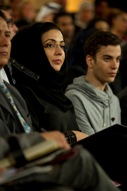 TIM SEBASTIAN
TIM SEBASTIAN
All right. Ladies and gentlemen, we've come to the point where we're going to vote on the motion: ‘This House believes Arabs, not NATO, should be dealing with Libya'. If you'll just take your voting machines, let me explain to you: if you want to vote for the motion - that's the side represented by those on my right - you press Button 1. If you want to vote against the motion - the side represented by those on my left - it's Button 2. Whichever button you want to press, please do it now.
PAUL SALEM
Can you take the Arab position and do Yes but not do...?! [Laughs]
TIM SEBASTIAN
No, you can't, no! [Laughter] And the voting is already underway anyway.... There's the result! [Cheers, applause] We have 45 percent for the motion, 55 percent against. The motion has been rejected. All that remains for me to do is to thank our distinguished speakers. Thank you very much for coming. Thank you to you, the audience, as well. The Doha Debates will be back again in a month's time. Till then, from all of us on the team, have a safe journey home. Goodnight! Thanks for coming. Goodnight. [Applause]
Watch online

